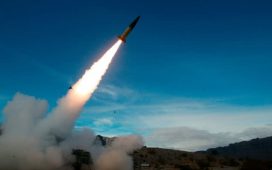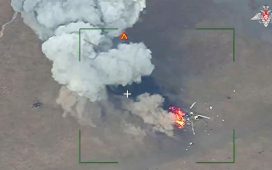A UK foreign minister will travel to Iran on Sunday for talks to urge de-escalation after the US came to the brink of conflict with the Islamic republic over its shooting down of a navy drone.
Andrew Murrison, UK minister for the Middle East, will engage in “frank and constructive” talks with Iran at a time of “increased regional tensions”.
He will also raise concerns about Iranian threats to cease complying with the 2015 nuclear deal, from which the US has withdrawn but to which the UK, along with other world powers, remains committed.
At the eleventh hour, Donald Trump called off planned strikes on three targets that had been planned in response to the downing down a surveillance drone in the Gulf of Oman. Iran said the drone had been spying over its airspace; the US said it was shot down over international waters.
The president, who said he was not looking for war, on Friday explained his decision by citing an assessment that the likely death toll would have been around 150, arguing that this would have been a disproportionate response to the drone’s destruction.
Iran’s foreign ministry responded on Saturday by saying it would not allow any violation of its territorial integrity, pledging to “firmly confront any aggression of threat by America”, according to the semi-official Tasnim news agency.
The prospect of US military action against Iran has raised fears of a sharp response from the Islamic republic and its proxies in Iraq, Lebanon and Yemen, potentially embroiling Israel and the Gulf states in a devastating regional war.
Saudi Arabia and close ally the United Arab Emirates have welcomed an elevated US military presence in the Gulf and tighter US sanctions on Iranian exports as Riyadh and Abu Dhabi seek to constrain Tehran’s influence across the Arab world.
The drone incident followed attacks on two oil tankers in the Gulf of Oman on June 13, which the US and Saudi Arabia blamed on Iran. Tehran has denied responsibility.
On the other side of the Arabian Peninsula, the Yemeni Houthi militia has escalated the frequency of drone and missile attacks against Saudi infrastructure, including a desalination plant, airport and oil pipeline.
In 2015, Saudi Arabia led a military intervention in Yemen in 2015 aiming to restore the government ousted by the Iran-allied Houthis. The war, now deadlocked, has left more than 90,000 dead in the impoverished Arab state.
The intensification of military activity in the Gulf, including Iran’s use of surface-to-air missiles against US drones, prompted the US Federal Aviation Authority to bar US-airlines from flying in Iranian-controlled airspace in the Strait of Hormuz and Gulf of Oman.
Abu Dhabi’s Etihad on Saturday followed other UAE-based airlines in suspending operations through this corridor.
Etihad said the use of alternative flight paths on a number or routes would cause delays from Abu Dhabi owing to increased congestion and longer journey times.
Dubai’s Emirates airline on Friday said it was rerouting flights away from areas of possible conflict, which has “minimally affected” timings of some flights.
Flydubai, Dubai’s low-cost carrier, also said it had adjusted some flight paths as a precautionary measure.








